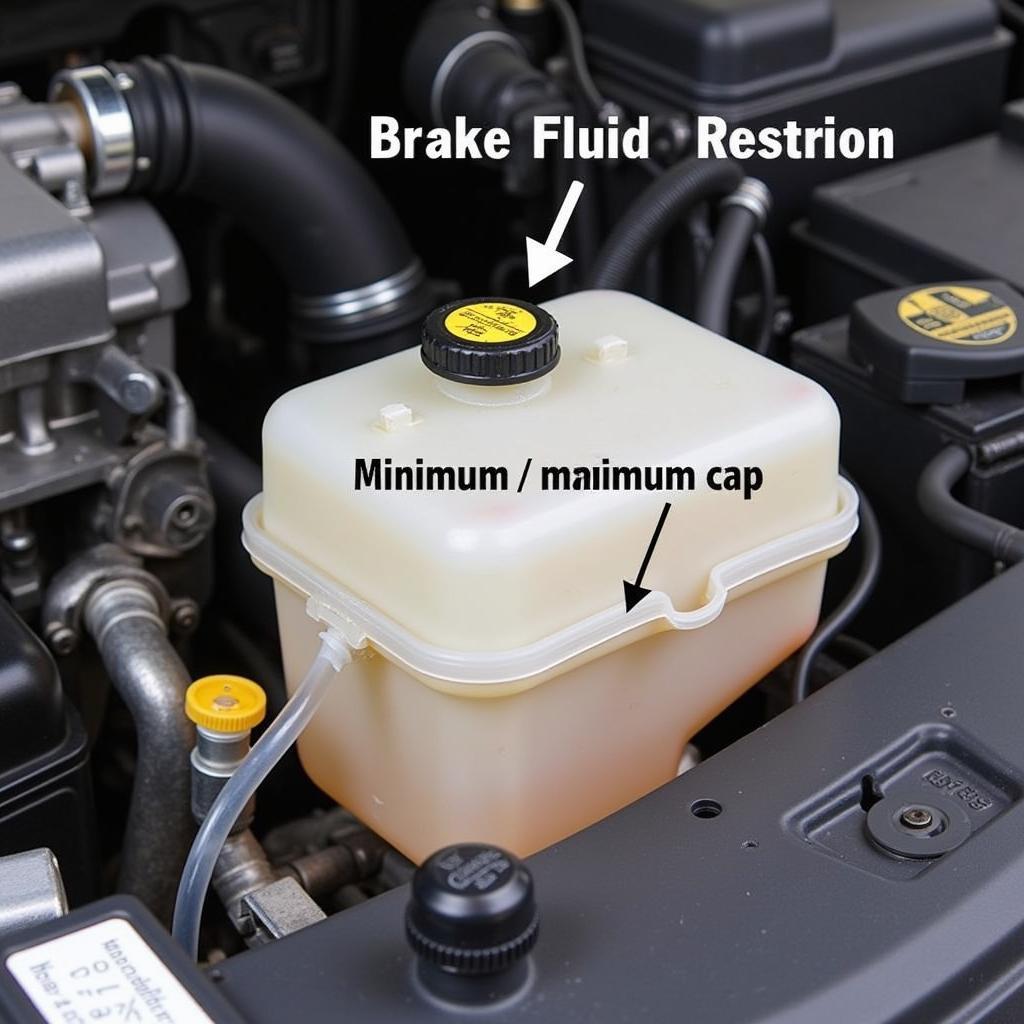The brake system warning light on your Toyota Camry can be a real headache. It’s a signal that something isn’t right with your braking system, and ignoring it could lead to serious safety issues. This comprehensive guide will help you understand the common causes of this warning light and provide actionable steps to troubleshoot and fix the problem.
Understanding Your Camry’s Brake System Warning Light
The brake warning light is a critical safety feature. It illuminates for a variety of reasons, from a simple parking brake engagement to more complex issues like low brake fluid or a malfunctioning ABS system. Understanding what triggers this light is the first step towards resolving the issue.
Common Causes of the Brake Warning Light
Several issues can trigger the brake system warning light in your Toyota Camry. Let’s explore the most common culprits:
- Low Brake Fluid: This is the most frequent cause. Low brake fluid can indicate a leak in your brake lines or worn brake pads.
- Engaged Parking Brake: Sometimes, the simplest explanation is the right one. Make sure your parking brake is fully released.
- ABS Malfunction: If there’s an issue with your Anti-lock Braking System (ABS), the warning light might illuminate. This usually requires professional diagnosis.
- Faulty Brake Light Switch: A malfunctioning brake light switch can sometimes trigger the brake warning light as well.
- Worn Brake Pads: Brake pads wear down over time. When they reach a certain point, a sensor triggers the warning light.
 Toyota Camry Brake Fluid Reservoir
Toyota Camry Brake Fluid Reservoir
Troubleshooting the Brake Warning Light
Here’s a step-by-step guide to help you troubleshoot the brake system warning light in your Toyota Camry:
- Check the Parking Brake: Ensure the parking brake is fully disengaged.
- Inspect Brake Fluid Level: Locate the brake fluid reservoir under the hood. Check the fluid level. If it’s low, add the correct type of brake fluid recommended for your Camry.
- Check for Leaks: Inspect the brake lines and around the wheels for any signs of brake fluid leakage.
- Inspect Brake Pads: Visually check the brake pads through the wheel spokes. If they appear thin or worn, they likely need replacing.
- Test Brake Lights: Have someone watch your brake lights while you press the brake pedal. If they don’t illuminate, the brake light switch might be faulty.
When to Seek Professional Help
While some issues can be resolved with simple DIY fixes, others require professional expertise. If you’ve checked the basics and the warning light persists, or if you suspect an ABS issue, it’s crucial to take your Camry to a qualified mechanic. Ignoring a persistent brake warning light can lead to dangerous driving conditions.
“Ignoring your brake warning light is like ignoring a fire alarm,” says John Smith, ASE Certified Master Technician. “It’s a crucial safety signal that shouldn’t be taken lightly. Addressing the issue promptly can prevent serious and costly repairs down the line.”
Using Remote Diagnostics and Programming
Modern technology allows for remote diagnostics and programming of vehicle systems, including brakes. This can be particularly useful for diagnosing intermittent issues or accessing specialized software for module resets. A qualified technician can remotely access your vehicle’s systems to pinpoint the problem and potentially resolve it without a physical visit.
Conclusion
The brake system warning light in your Toyota Camry is a vital safety indicator. Addressing the underlying issue promptly is crucial for ensuring safe driving conditions. By following the steps outlined in this guide, you can troubleshoot the problem and determine the appropriate course of action. Remember, when in doubt, consult a qualified mechanic. Don’t compromise your safety – a properly functioning brake system is paramount.
“Regular brake maintenance is key to preventing issues,” adds John Smith. “Simple checks like monitoring fluid levels and inspecting brake pads can significantly extend the life of your braking system and keep you safe on the road.”
FAQ
- Can I drive my Camry with the brake warning light on? While possible, it’s highly discouraged. Driving with a potential brake issue can be dangerous.
- How much does it cost to fix a brake system warning light issue? The cost varies depending on the underlying cause. It can range from a simple top-up of brake fluid to more expensive repairs like replacing brake pads or calipers.
- How often should I check my brake fluid? It’s recommended to check your brake fluid level at least once a month.
- What type of brake fluid should I use in my Toyota Camry? Refer to your owner’s manual for the correct type of brake fluid recommended by Toyota.
- Can I replace my brake pads myself? While possible for experienced DIYers, it’s often best to leave brake pad replacement to qualified mechanics.
- What is ABS and why is it important? ABS stands for Anti-lock Braking System. It helps prevent wheel lockup during hard braking, allowing you to maintain steering control.
- How can remote diagnostics help with brake issues? Remote diagnostics can help identify the root cause of the brake problem more efficiently, potentially saving time and money on unnecessary repairs.
